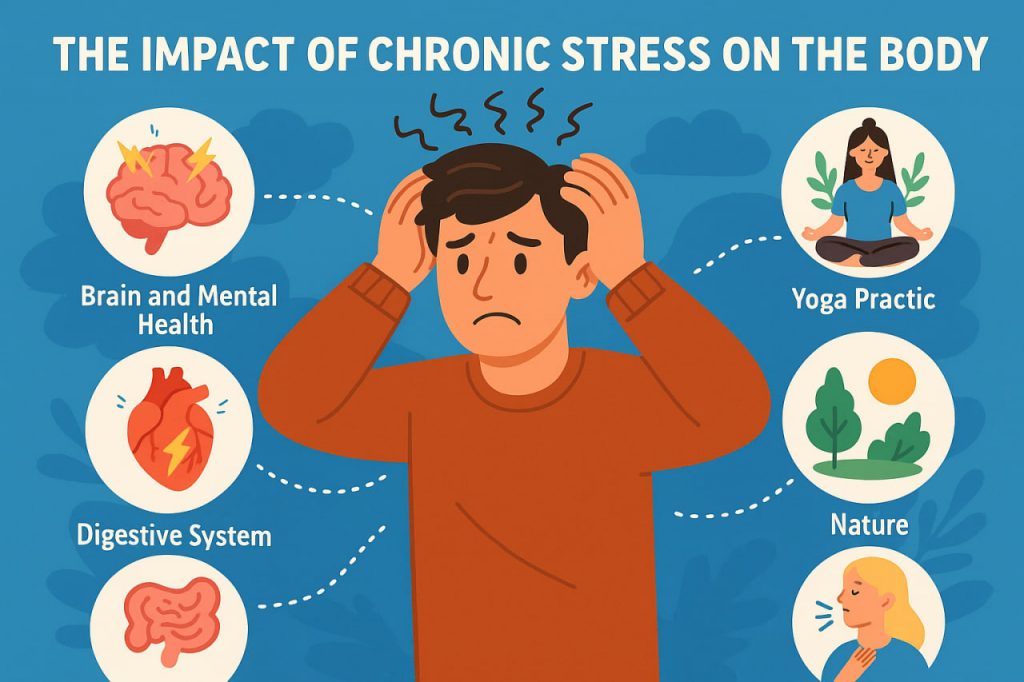Stress is a natural and necessary part of life. In small doses, it helps us react to challenges and stay alert. However, when stress becomes chronic—lasting for weeks, months, or even years—it can harm nearly every system in the body. Understanding how long-term stress affects health is essential for prevention and recovery.
What Is Chronic Stress?
Chronic stress is a prolonged and constant feeling of stress that can arise from ongoing life pressures such as:
- Financial problems
- Work overload
- Relationship conflicts
- Caring for a sick loved one
- Living in unsafe or unstable environments
Unlike acute stress (a short-term response to danger or pressure), chronic stress keeps the body’s “fight-or-flight” system activated far beyond what’s healthy.
How Stress Affects the Body
- Brain and Mental Health
- Increases risk of anxiety, depression, and burnout
- Impairs memory and focus
- Shrinks the hippocampus (key area for learning and emotions)
- Can cause sleep disturbances and insomnia
- Cardiovascular System
- Raises blood pressure and heart rate
- Increases risk of heart disease, heart attacks, and stroke
- Promotes inflammation in blood vessels
- Immune System
- Weakens immunity, making you more prone to infections
- Slows wound healing
- May trigger autoimmune diseases
- Digestive System
- Causes stomach pain, bloating, and acid reflux
- Worsens IBS (irritable bowel syndrome)
- Alters gut microbiota balance
- Endocrine and Hormonal System
- Overproduces cortisol (stress hormone)
- Disrupts hormonal balance, affecting appetite and metabolism
- Contributes to weight gain, especially abdominal fat
- Muscles and Joints
- Causes chronic muscle tension
- Increases risk of headaches, migraines, and jaw pain
- May worsen arthritis symptoms
- Reproductive Health
- Disrupts menstrual cycles and fertility
- Decreases libido
- May affect hormone levels in men and lower sperm count
Signs of Chronic Stress
- Constant fatigue
- Sleep problems
- Irritability or mood swings
- Muscle pain and headaches
- Digestive discomfort
- Weakened immunity
- Feelings of helplessness or isolation
If these symptoms persist without a clear medical cause, chronic stress might be the underlying issue.
How to Manage Chronic Stress
- Practice relaxation: Deep breathing, meditation, yoga
- Exercise regularly: Even a short walk reduces cortisol
- Prioritize sleep: Create a consistent, calming routine
- Eat well: Support your nervous system with balanced meals
- Connect socially: Talk to friends, family, or therapists
- Set boundaries: Say no to excessive demands
- Limit stimulants: Reduce caffeine and screen time, remove alcohol
Conclusion
Chronic stress is not just “in the mind”—it’s a real biological burden that can silently damage organs and systems over time. The good news is that it’s manageable. With daily habits focused on mental and physical recovery, you can lower stress levels and restore health and balance.
Glossary
- Cortisol: The body’s primary stress hormone, involved in energy and alertness.
- Fight-or-Flight: The body’s emergency response system to danger.
- Hippocampus: Brain structure linked to memory and emotions.
- Inflammation: The body’s immune response that, when prolonged, can lead to disease.


